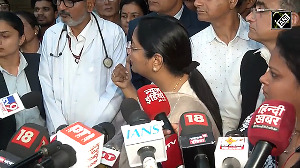The big-ticket announcement during US President Barack Obama's visit to India starting November 6 will be about lifting controls on the export of high-technology items to India. "We are looking forward to a significant announcement on export controls," said US Commerce Secretary Gary Locke in an exclusive interview to Business Standard.
In addition, a senior White House official, who asked not to be identified, said a significant part of the visit would involve an announcement of the consummation of several business deals.
The US administration expects business deals worth over $10 billion across several sectors to be signed during Obama's visit. The deals, which have already been "tied up", according to another official familiar with the matter, would include a widely anticipated order for military transport aircraft from Boeing.
But Obama will also bring a wish-list of items on which the US seeks action from the Indian government, and is likely to discuss these in his meetings with Prime Minister Manmohan Singh, according to US officials.
In fact, an administration official indicated this would be an important priority for the US. The official pointed out that the portion of Indo-US trade governed by US export controls is "actually very small" and that the US wants a "level playing field" in the rest of the trade areas. He made it clear that both Obama and Locke would talk to their counterparts about "very significant tariff and non-tariff barriers standing in the way of greater US involvement in the Indian economy".
Locke singled out concerns in the financial services, clean energy and telecom sectors. US officials will bring up the issue of mandatory technology transfer by American suppliers in the telecom sector. On clean energy, Locke said, "We are concerned that there are some requirements that various clean energy components, whether wind turbines or solar equipment, must have been largely manufactured in India."
Asked how US objections to local content provisions squared with the "Buy American" provision that was included in the US stimulus Bill of February 2009, Locke said the commerce department had waived several of those requirements for purchases by state and local governments.
The commerce secretary acknowledged Indian industry's concerns about the recent increase in H-1B visa fees, an action that disproportionately targeted Indian IT firms, but said any remedial action on this front would be up to the US Congress.
Moves to bar outsourcing in states like Ohio have been another irritant for Indian businesses.
In fact, "India" and "Bangalore" seem to have become default terms for outsourcing, with Obama himself often referring to the city in the context of American companies creating jobs abroad. Locke insisted that the US worries more about Beijing than about Bangalore on this issue.
Referring to the campaigns for Tuesday's mid-term elections in which Obama's Democratic Party lost control of the US House of Representatives, and also saw its majority shrink in the Senate, Locke said, "Most of the candidates have actually focused on US companies that send jobs to China, not to India."
Locke added that Obama was firmly opposed to protectionism. "The President has often times said that we have to guard against protectionism, and we must avoid at any cost any type of trade war," he said.
On the US India Business Council's proposal for a free trade agreement between the two countries, Locke said that could be a goal "down the line", but promised, "Short of a free-trade agreement, we are hoping to next week make announcements that will elevate the relationship and remove barriers between the two countries in terms of trade."
One area where expectations are low is on the nuclear front. Signalling that the decks are not yet clear for American firms to do business in India under the civilian nuclear agreement, despite India signing the Convention on Supplementary Compensation last month, the White House official said, "We welcome the signing of CSC by India and continue to work through issues to ensure a level playing field for US companies," but he declined to identify the issues.
Legal experts caution that more work remained to be done with regard to India's ratification of the CSC and alignment of its laws with the international convention. James Glasgow, a Washington partner in law firm Pillsbury Winthrop Shaw Pittman's energy practice, said, "The significance of any country signing the CSC depends on that country having national laws that are consistent with the fundamental principles that are set forth in the Annex to the CSC."
"Lingering questions about the consistency of any signatory's national law with the principles of the CSC will raise doubts about the CSC's ability to actually serve as a mechanism to achieve an internationally accepted regime for nuclear liability," he added.
Obama will reach India weighed down by the severe losses for his party in the mid-term elections. The reversal is being interpreted in the US as a rebuff to the president's handling of the economy, even as unemployment stays around the 9.5 per cent mark. Obama will face increasing pressure to create jobs, and the White House will hold up the business deals expected to be signed in India as steps in that direction.
Locke also noted that FDI from India was among the fastest growing investment trends in the US, and that Indian companies currently employed nearly 60,000 workers in the US.









 © 2025
© 2025